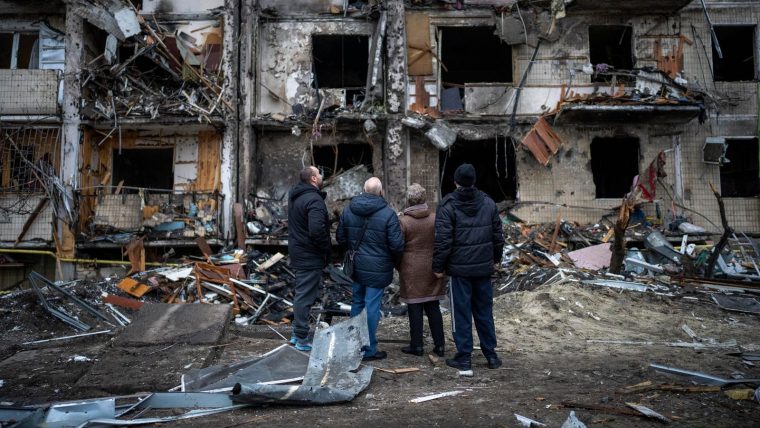By Sivan Gamliel
As we speak, the war between Russia and Ukraine continues unabetted. While the West imposed crippling sanctions on Russia, this has not deterred Russian President Vladimir Putin from continuing to attack the Ukraine. As Human Rights Watch reported, “The Russians are raining mortar shells into the area. People are running in all directions to escape the shelling.”
In fact, the International Red Cross reported that an area that was supposed to be a humanitarian corridor enabling citizens to flee was laden with landmines and a Ukrainian fighter claimed that buses that were supposed to be used to evacuate civilians were bombed by the Russians.
One local Ukrainian told the Israeli media, “This is not war. This is the intentional murder of the Ukrainian people. Mariupol was completely under siege for a week. There is no light, no heating, no cellular network, and no internet. There is no way out. The humanitarian corridor is a lie, and the Russians don’t let any humanitarian assistance in. There is a shortage of food and medicine.” In recent days, Chabad evacuated 140 Jewish Ukrainian children between age 2 and 12 from the war-torn country. The question remains, how will this affect the Middle East?
Sirwan Renas, an independent Kurdish researcher, stated in an exclusive interview: In international relations, any change in the balance of power most likely affects the established political order. The current order led by the United States has been challenged by the rise of emerging powerful states, especially China. The questionable function of the US in Iraq, Afghanistan, and Syria demonstrates that the US is not the only superpower determining the cause of regional issues in the Middle East.”
Renas noted that countries like Iran and Turkey have become major regional powers: “They do not conceive of themselves as nation-states but rather as historical entities inheriting a civilization. They consider themselves to be alternatives to the regional order. Additionally, with the rise of a new wave of nationalism in recent decades, stateless nations such as the Kurds in the Middle East have challenged the sovereignty of the occupying states by claiming their right to national self-determination.”
Renas is not positive that Russia will take over the Ukraine at this point: “The Ukrainian stiff resistance, coupled with a united and strong backing of the Western democratic countries, has surprised Russia. In the longer term, however, one can imagine two possible scenarios: first, Russia will take over Ukraine and pay the economic costs of its invasion. In this case, the US would be considered a declining power by Iran and Turkey in the Middle East. These regional powers will become more interventionist in their policies and challenge the existing regional order. This would weaken the Kurdistan autonomous regions of Rojava (AANES-Syria) and Bashur (KRG-Iraq) which rely on the US support for their stability.”
He claimed: “The US has been historically more supportive of the Kurdish national liberation movement (Iraq and Syria) compared with Russia. In the worst-case scenario, Iran and Turkey will crash both of the Kurdish autonomous regions as the US has to focus more on the rising threats of China and Russia than on the Middle East. The fate of Ukraine under the Russian assault due to its geopolitical importance for both the US and Russia is a good analogy for Kurdistan. Kurds will most likely encounter such a destiny sooner or later. That means, Kurds should play a delicate political game in order for them to not be crushed between authoritarian regional powers and US foreign policy.”
According to him, “It is worth mentioning that the tripartite relationship between Turkey, Russia and NATO is a complex one since, on the one hand, Turkey is a member of NATO, and, on the other hand, Turkey under Erdogan follows a foreign policy that might not align with its commitments to NATO at times. So far in the conflict, Turkey has closed the Black Sea to Russian warships, but the Russian-Turkish relationship under the shadow of NATO remains an open question, especially considering the fact that Turkey would need Russia’s cooperation in Syria. That means, there are threats and opportunities for Kurds depending on the Russian-Turkish relationship.”
“In the second scenario, if Russia fails to take over Ukraine, and even though the Western powers’ sanctions against Russia will hugely damage its economy, Russia will probably target the US interests in the Middle East more aggressively,” he added. “Once again, the regional politics in the Middle East become more unstable. In short, one should expect more political instability in the Middle East in both scenarios.”
Renas concluded: “As for Israel, like the Kurds, any decline in the US power in the Middle East is troublesome. Nevertheless, as a strong regional power, Israel has shown that it can manage such changes successfully. An example of such successful management in Israel’s foreign policy is already on display as Israel has followed a delicate balancing act in the Russian assault on Ukraine.”







